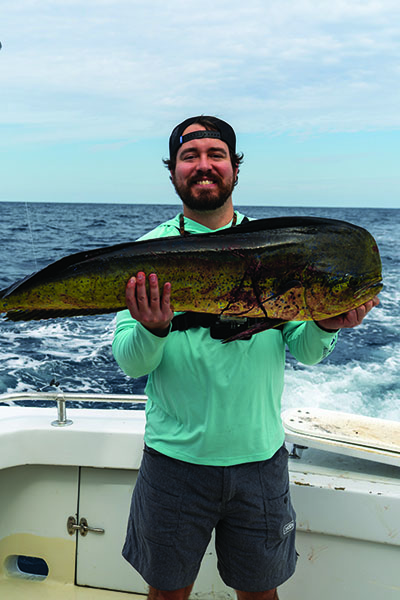July 18, 2025
from the Record, Spring 2025
NOT JUST FOR SPORT
American Sportfishing Association
A hunter growing up, Allen Luck ’12 was first introduced to fishing as a freshman at Hampden-Sydney. Dormmate Charlie Parrish ’12 invited him to cast a line in Tadpole Pond. After catching his first campus catfish and grilling it up outside the dorm, Luck was hooked. He spent the whole next summer fishing, learning from YouTube videos and experimenting with different techniques and bait. The following year, Luck and Parrish started the Anglers Club on campus. The team of Luck, Parrish, and Dylan Bishop ’13 went on to win more than $25,000 in tournament prizes for Hampden-Sydney.
“When I get into something, it becomes obsession,” Luck says. That obsession has turned into a profession, as Luck now serves as assistant director of communications, digital media, and creative content for the American Sportfishing Association (ASA). A biology major at Hampden-Sydney, Luck is passionate about conserving the resources that he and ASA members rely on for both sport and income.
Beyond its social and health benefits, fishing plays a vital role in conservation efforts. Through fishing license sales and excise taxes on equipment and donations, America’s 57.7 million anglers contribute $2 billion annually to conservation efforts nationwide. Anglers can also sound the alarm to habitat changes and engage the appropriate people to help. Collaborating with researchers, state and federal agencies, regional councils, conservation partners and more, ASA champions science-based, commonsense policies and sustainable fishing practices that protect fish populations and aquatic ecosystems—while ensuring the continued vitality of the sportfishing industry. From tackle manufacturers and recreational anglers to the fish and waterways that make the industry possible, Luck and his colleagues at ASA have a heavy load balancing the many stakeholders they represent.
At the end of the day, the species that call our waterways home are Luck’s and his colleagues’ top priority. “A lot of the work that we do is to ensure clean water, abundant fisheries, and access to both,” Luck says. “Without them, we couldn’t do what we do.”


